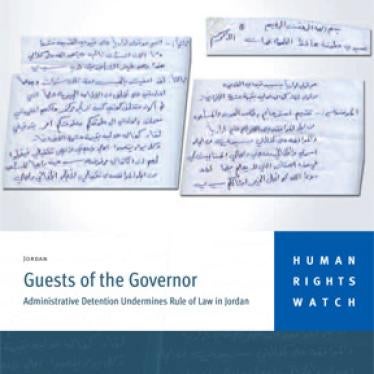(Amman) – Jordan should end administrative detention and abolish the Crime Prevention Law that authorizes the practice, Human Rights Watch said in a new report released today.
The 56-page report, “Guests of the Governor: Administrative Detention Undermines Rule of Law in Jordan,” details how governors and other officials routinely circumvent the criminal justice system when they detain people by administrative order and without judicial review. The practice is used against crime victims, personal enemies and people freed by the courts.
“Governors and other high officials shouldn’t be able to lock people up on vague suspicions of improper behavior,” said Joe Stork, deputy Middle East director at Human Rights Watch. “This is an invitation to abuse.”
There are more than 10,000 new cases of administrative detention each year, and administrative detainees amount to one in five inmates in Jordanian prisons.
In 1989, Jordan ended martial law, but since then, governors, who answer to the Ministry of Interior, have revived use of the 1954 Crime Prevention Law. The law permits detention by a simple administrative act, without having to show, much less prove, that a crime has been committed. The Crime Prevention Law grants governors the authority to detain persons who are “a danger to the people,” an excessively vague term that opens the door to routine abuse.
Governors frequently issue such orders against prisoners whose sentences have expired, persons arrested on suspicion of a crime but to whom judges have granted bail, and persons who may have prior criminal convictions. Governors and the police frequently resort to administrative detention to avoid sending criminal suspects for prosecution and trial under the regular criminal justice system, which affords them rights administrative detainees do not have. These rights include a presumption of innocence, judicial review of pre-trial detention, and a fair trial based on the evidence against them.
“Governors should not be able to overrule the courts by jailing people who judges have said can safely remain free,” Stork said.
In a particularly perverse application of the law, governors have jailed victims of crimes instead of the perpetrators. Some women threatened with family violence have spent over ten years in administrative detention, allegedly for their own “protection.” Governors have similarly detained victims of threats of tribal revenge.
Another category of persons subject to arbitrary administrative detention are women suspected of “immoral behavior,” including women found alone in the presence of an unrelated man. Street vendors, usually men, are also susceptible to administrative detention. In several cases, governors or their assistants abused their powers of detention by arresting persons against whom they had a personal grudge.
The government has ignored calls over the past four years by Jordanian rights activists, including the National Center for Human Rights, to review the practice of administrative detention.
The length of administrative detention is not fixed. Administrative detainees commonly go on hunger strike to try to seek a review of their cases, because challenging their detention in court, even where feasible, is costly. Prison wardens often deny hunger strikers access to water, in violation of international prison standards, in order to shorten the duration of the strikes.
“The cries for release from administrative detainees on hunger strikes are the human face of the breakdown of independent judicial oversight over governors’ powers to detain persons almost at will,” said Stork.







